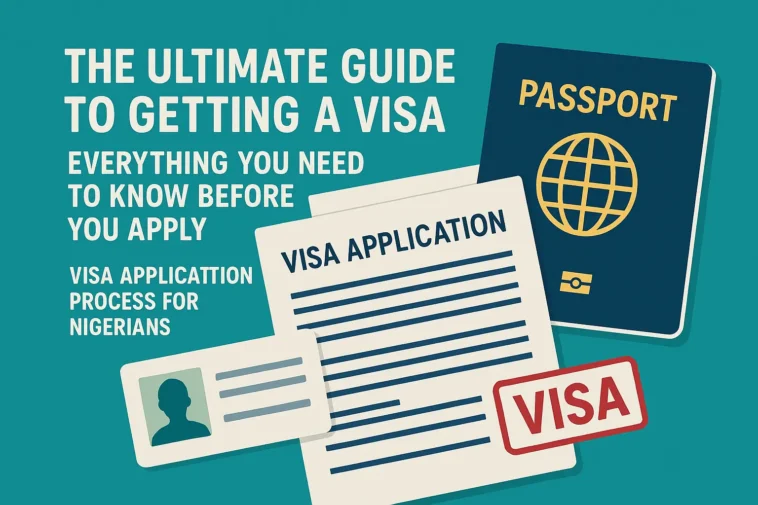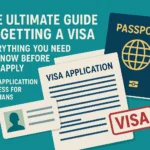Introduction: Why Getting a Visa is Important for International Travel
Whether you’re planning to travel for leisure, business, or studies, a visa is often your gateway to the world beyond your borders. As a Nigerian or African traveler, obtaining a visa can be a daunting task, but with the right knowledge and preparation, the process can be manageable. This guide walks you through everything you need to know before applying for a visa, from choosing the right type of visa to handling the interview with confidence.
Types of Visas and Why They Matter
Visas come in various forms depending on the purpose of your travel. Here’s a breakdown of the most common visa types you’ll encounter:
- Tourist Visas: If you’re traveling for leisure, to explore, or to visit friends and family, this is the most common visa type. Tourist visas are typically short-term and come with restrictions on work or study.
- Business Visas: For those traveling to attend conferences, meetings, or to start business ventures abroad, a business visa is necessary. This type of visa also allows for some limited business activities while abroad.
- Student Visas: Planning to study abroad? A student visa is your ticket. This type of visa often comes with the option to work part-time during your studies.
- Work Visas: Many countries require a work visa for employment. These visas are usually tied to a specific job or employer and may require proof of skills or job offers.
- Permanent Residency Visas: These are for those looking to settle in a country permanently. They often require proof of employment, family ties, or long-term plans.
Understanding the Visa Application Process
The visa application process can seem overwhelming, but it follows a straightforward pattern in most cases. Here’s a step-by-step guide to help you navigate it:
- Determine the Visa Type: Before you start your application, it’s crucial to know which visa type suits your purpose. Visit the embassy’s website of the country you’re applying to for detailed information.
- Gather Required Documents: Each visa type has its specific documentation. Common requirements include a valid passport, proof of financial support, travel insurance, and sometimes accommodation bookings.
- Fill Out the Application Form: Most countries have an online application form. Make sure you provide accurate and truthful information.
- Schedule an Interview: Many visa types, particularly those for long-term stays, require an interview at the embassy. Be prepared with all documents.
- Pay Fees and Submit Documents: After filling out the forms and scheduling the interview, you’ll need to pay the visa fees. The cost varies by country and visa type.
Common Visa Requirements Nigerians Need to Know
Every country has its visa requirements, but there are common documents most countries will require from Nigerian applicants:
- Valid Passport: This is the most critical document. Make sure your passport is up to date and has sufficient validity (usually at least six months beyond your travel date).
- Proof of Funds: You may need to show that you can support yourself financially during your stay. This could be in the form of recent bank statements, a letter of sponsorship, or a bank guarantee.
- Travel Insurance: Many countries, especially those in Europe, require travel insurance that covers health and emergencies while abroad.
- Accommodation Details: You’ll likely need to provide information on where you’ll be staying, whether in a hotel, with a friend or relative, or in university dorms.
How to Fill Out a Visa Application Form
Completing the visa application form is one of the most crucial steps in the process. Here are some tips for filling out the forms:
- Be Accurate: Ensure all your details are accurate, from your name to your travel dates. Mistakes can lead to delays or rejections.
- Read Instructions Carefully: Take time to read through the instructions before filling out the form. Some countries have specific requirements that you need to follow.
- Avoid Over-Explaining: Stick to the facts and avoid offering too much unnecessary detail unless asked.
Visa Interview: What to Expect
For many visa applications, an interview is required. Here’s how to ace it:
- Prepare Your Documents: Ensure all your documents are in order and available for review.
- Stay Calm and Confident: Visa officers may ask questions about your travel purpose, your financial situation, and your ties to Nigeria. Be calm and answer truthfully.
- Practice Common Questions: Expect questions like: “Why are you traveling?”, “How long do you intend to stay?”, and “How will you fund your trip?” Practice your responses but keep them natural.
Visa Fees and Processing Times
Visa fees vary depending on the destination country and visa type. For example, a Schengen visa might cost more than a tourist visa for the USA. Additionally, processing times can range from a few days to several weeks. Always apply well in advance to avoid complications.
Visa Rejection: What Went Wrong and How to Avoid It
Unfortunately, visa rejections can happen. Some common reasons for rejection include incomplete documentation, failing to meet financial requirements, or providing inaccurate information. If your visa is denied, carefully review the rejection notice, correct any mistakes, and consider reapplying.
Tips for a Successful Visa Application
Here are some essential tips to ensure your visa application is a success:
- Start Early: Give yourself plenty of time to gather documents and complete forms.
- Be Thorough: Double-check every document before submission. Ensure all information is accurate and up-to-date.
- Follow Up: After submission, keep track of your application status and stay in contact with the embassy.
Conclusion: Navigating the Visa Process with Confidence
Getting a visa doesn’t have to be intimidating. By following the steps outlined in this guide, you can navigate the application process confidently and increase your chances of approval. Whether you’re traveling for business, leisure, or study, the right preparation is the key to a successful visa application.




